 Selected Poems of
Selected Poems of
Gerard Manley HopkinsEdited and with an Introduction by Bob Blaisdell DOVER PUBLICATIONS, INC.
DOVER PUBLICATIONS, INC.
Mineola, New York DOVER THRIFT EDITIONS
G ENERAL E DITOR : M ARY C AROLYN W ALDREP
E DITOR OF T HIS V OLUME : B OB B LAISDELL Copyright Copyright 2011 by Dover Publications, Inc.
All rights reserved. Bibliographical Note This Dover edition, first published in 2011, is a new selection of poems from standard texts. A new introductory Note has been specially prepared for the present edition. Library of Congress Cataloging-in-Publication Data Hopkins, Gerard Manley, 18441889.
[Poems. Selections]
Selected poems of Gerard Manley Hopkins/Gerard Manley Hopkins; edited and with an introduction by Bob Blaisdell.
p. cm.(Dover thrift editions)
Includes bibliographical references and index.
ISBN-13: 978-0-486-47867-8
ISBN-10: 0-486-47867-X
I.
Blaisdell, Robert. II. Title. III. Series.
PR4803.H44A6 2011
821.8dc22 2010048402 Manufactured in the United States by Courier Corporation
47867X01
www.doverpublications.com  Contents
Contents
 by Bob Blaisdell
by Bob Blaisdell Born on July 28, 1844, in Stratford, near London, Gerard Hopkins was the son of Manley Hopkins, an occasional writer whose profession was insuring ship-owners. Gerard (no one used his middle name Manley; that name became associated with the poet to distinguish him from another writer) was the eldest child, and grew up in Stratford and Oak Hill, Hampstead: Hopkins had the advantages of the countryside and the largest city in the world.
Born on July 28, 1844, in Stratford, near London, Gerard Hopkins was the son of Manley Hopkins, an occasional writer whose profession was insuring ship-owners. Gerard (no one used his middle name Manley; that name became associated with the poet to distinguish him from another writer) was the eldest child, and grew up in Stratford and Oak Hill, Hampstead: Hopkins had the advantages of the countryside and the largest city in the world.
He could go to the galleries, special exhibitions, museums, churches, meetings, open-air spectacles, the London parks, and theatres. As a country boy he became accustomed to trees and open skies. As he pursued his studies, he became more and more reflective about and attracted by Roman Catholicism, the attractions that more than twenty years before had led to a high church/low church controversy in the Church of England and John Henry Newmans leaving Oxford for Roman Catholicism. By the time Hopkins was at Oxford, a student going over to Catholicism was rare but not shocking. When Hopkins was twenty, he could envision his own conversion, as disappointing as he knew this would be to his family. Cardinal Newman was the most influential and famous of Victorian Englands Catholics, and Hopkins corresponded with him about his desire to join the church.
On October 21, 1866, he converted. While Hopkins would not have been admitted to Oxford as a Catholic, he was not forbidden from completing his degree. Newman encouraged the young man but cautioned: it does not seem to me that there is any hurry about ityour first duty is to make a good class. Show your friends at home that your becoming a Catholic has not unsettled you in the plain duty that lies before you. And, independently of this, it seems to me a better thing not to hurry decision on your vocation. Suffer yourself to be led on by the Grace of God step by step.
Hopkins, though, was not one for half-measures, and yearned to join the priesthood. As a test run, Newman invited him to teach at a boys school in Birmingham in the West Midlands, and the scholarly Hopkins hesitated, unsure if he was cut out for the childrens classroom. Teaching and pedagogical administration would be, however, Hopkinss primary religious social service for the rest of his life. He was almost immediately overwhelmed by the grind of teaching, but, as always, his creative impulses kept flowing, and in the midst of his labors first noted his pet ideas of inscape and instress. During his second term in Birmingham, he reflected in a letter to an Oxford friend: Teaching is very burdensome, especially when you have so much of it: I have. I have not much time and almost no energyfor I am always tiredto do anything on my own account.
I want to write still and as a priest I very likely can do that too, not so freely as I shd. have liked, e.g. nothing or little in the verse way, but no doubt what wd. best serve the cause of my religion. His friends and family tried to respect Gerards decision, a decision that obviously inconvenienced him more than it could anyone else. Not only would he devote himself to his new religion, but without being asked to do so he would sacrifice his poetry, burning his old drafts (final drafts he preserved or had given to his mother or to his friend Robert Bridges to preserve).
He would deny himself the great pleasure of composing verse, unless expressly asked to do so by his superiors. This poetic drought stretched for seven years, with the flow of Hopkinss creative expression running deep underground. Of course, this was the very life he chose; a twentieth-century Jesuit admirer of Hopkins reminds us: Let it be plainly stated then at the outset: Religious orders have no crying need of poets; nor, yet again, craving for the honor of their company. Be the poets of major, minor, or mediocre attainments, religious orders flourish grandly like the cedars of Lebanon without them. With them they continue to do so provided the poets in question rest content with their chosen common lot. Hopkins began his long study and training for the priesthood in 1868 and was assigned to a novitiate in London.
After two years, he started his three-year philosophate in Stonyhurst, Lancashire. In 1874, he proceeded in the next stage of his priesthood, moving to St. Beunos in north Wales, where he may have been happier and more fulfilled than he had ever been before or would be later. He loved the natural environment, the birds, the walks, the air; the musicality of the Welsh language, which he set out to learn, became characteristic of his chiming verse. It was here, at St. Beunos, in the midst of his studies, that he was encouraged to write verse again and was able to allow himself brief spells of glorying in poetry.
What happened? The New York-bound SS Deutschland, carrying more than a hundred passengers, including a group of five nuns exiled from Germany, foundered in a storm on a sand bar in the mouth of the Thames. The nuns were among the many who drowned. In Paul Marianis biography, there is no more thrilling episode than the story of Hopkinss excited composition of The Wreck of the Deutschland: Perhaps it was on the evening of December 11 [1875] that Father Jones saw Hopkins reading the account of the Deutschland disaster and, seeing how moved he was by what hed read theredid mention in passingand to comfort the manthat it might be nice if someone wrote a poem on the subject, especially in light of the witness the tall nun had given in her extremity. Whatever hint Jones did drop, it is enough for Hopkins, who has been chaffing for years now for just such a chance to release himself from his self-imposed exile and begin composing again. And there is no better analysis of Hopkinss weird and wild long poem than in Elisabeth Schneiders study. She notes: The main theme of Part the First is his own conversion; that of Part the Second, the hoped-for conversion of all England, for which certain events connected with the shipwreck are conceived as the spark and the signal.
Within the limits of its bare thematic frame, however, Hopkins explicitly or by implication crowded nearly everything in life about which he felt deeply. Reading the poem, one has the feeling that, his poetic pen licensed after that decade of largely self-imposed silence, he was writing as if he might never again be free to write and must set down in this one work all that remained to him of value and hope on earth. After a few months of revision, he submitted The Wreck of the Deutschland to a Catholic magazine, and for several months expected its publication; finally, the editor, nervous perhaps about its unconventionality and original theologizing, decided against presenting it to the public. Hopkins thereafter convinced himself that if his work was meant for publication, it would have to come after his death. His devoted friend and editor, Robert Bridges, a poet and doctor who collected and recopied almost all of Hopkinss poetic output, endured and countered Hopkinss reproaches, complaints, and criticisms as they explained and argued over each others poems (including The Wreck of the Deutschland, which Bridges heartily disliked). When they were not learning from and inspiring each other, they often stamped on each others literary philosophies and opinions, and, less often, religious differences.
Next page
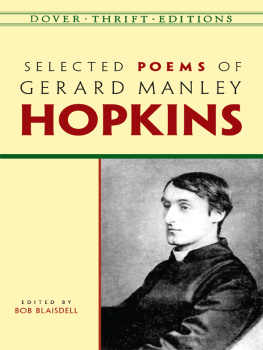

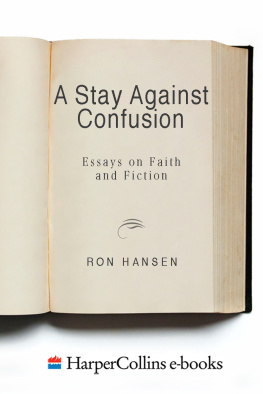
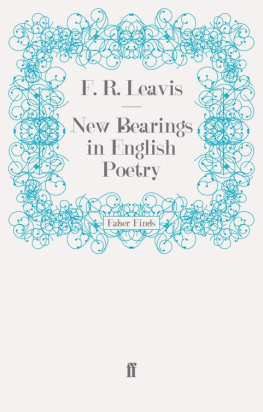
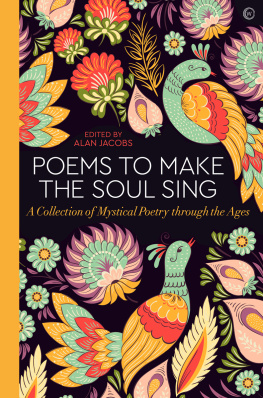
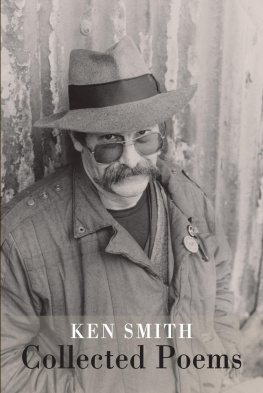
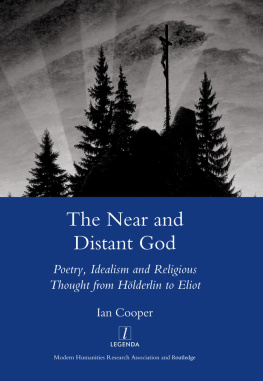

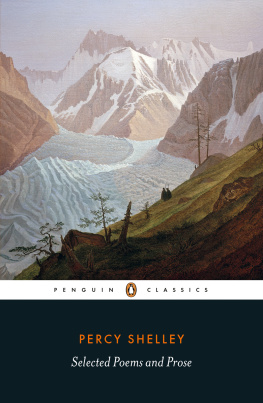
 Selected Poems of
Selected Poems of DOVER PUBLICATIONS, INC.
DOVER PUBLICATIONS, INC. Contents
Contents